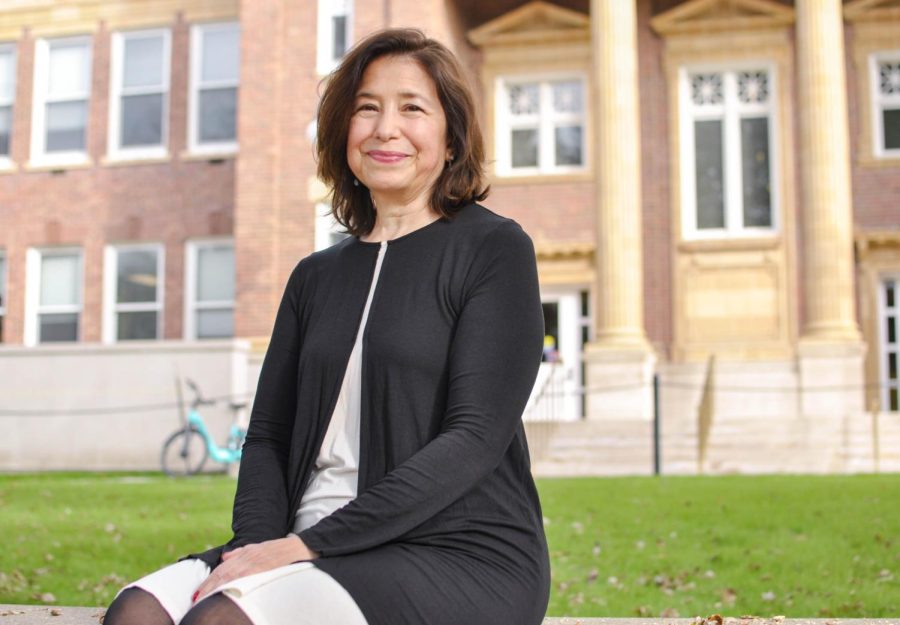Professor teaches students to appreciate past through archaeology
Anthropology professor, Lisa Lucero, inspires students to think and learn more about sustainability by looking at historic lifestyles and technologies.
Nov 10, 2021
University of Illinois professor Lisa Lucero, an internationally recognized archaeologist in the Anthropology department, studies the societal impacts of climate change by uncovering historical techniques of sustainable living and developing connections to modern-day climate issues.
Lucero said she wasn’t passionate about the archaeology of climate change when she first started researching the Mayans.
“I didn’t choose 30 years ago to go into impacts of climate change on society and sustainability when I started working with the ancient Mayans,” Lucero said. “The more I learned about the rise and fall of kings, the more I realized that climate instability played a role and looked for comparative stuff.”
Lucero said she feels as if academics should practice what they preach and try to better humankind.
She said her current research looks at the betterment of not only humans, but trees, plants, rocks, water and just about everything that we take for granted.
Get The Daily Illini in your inbox!
“It’s because we take it for granted, we overuse it, we abuse it and it’s led to where we are today,” she said.
Her research ranges from studying the ancient Mayans in central Belize to research collaborations with scholars working in other tropical regions like Cambodia and Sri Lanka. She’s garnered many accolades for her work and frequently travels to deliver lectures across the globe.
“I get these invitations because people like my research in terms of the traditional worldview and how we can apply it today,” she said.
She says she loved being on stage and presenting in front of huge audiences, but since she can only take a limited amount of questions, she prefers the smaller audiences. There is more room for discussion in smaller lectures.
“The whole purpose is not just highlighting the research, it is about engaging, and being engaged and being surprised,” she said.
Lucero has filmed documentaries with the BBC and has also received research grants from renowned forums like National Geographic, NSF and more. Most recently, her research was published in a special issue of the Journal of the British Academy, titled: “Climate, Disaster and Risk: Introduction.”
Co-authored with Robin Coningham, the purpose of the article was to show that we’re learning more from the past to survive in the future. Lucero said the public has to protect archaeological sites and not just for the sake of saving a site just because it’s ancient.
Lucero also further underlined the overlooked disadvantages of replacing human labor with technology. She said the Mayan civilization learned from their mistakes when building major water and reservoir systems and they became sophisticated but more labor-intensive.
“It’s just trying to find that balance for a better future in more labor-intensive projects,” she said. “It’s a domino effect and not in a good way so we can just step back and rely on the old muscle labor grits.”
She said how leaders need to find solutions from locally available resources before reaching out to newer avenues.
“I read about Elon Musk and it’s like great going to Mars, but ideas need to be more creative,” she said. “Like why we can’t somehow translate plants into a natural battery using photosynthesis, how plants can regenerate versus the finite resources that are used to make solar panels batteries.”
In addition to her lectures, Professor Lucero is in the process of publishing a book titled “Maya Wisdom, Family, and the Survival of our Planet.”
“This book is written for the general audience because I didn’t use a lot of jargon,” she said.
On teaching, Lucero said she tries to channel her enthusiasm.
“I see the class almost like a pulpit,” she said. “I can go in there and read off and sound like a robot, or I can get into it. This semester I’m teaching ‘Climate Change in Civilization’ with 39 students, 23 make different majors. That’s what I like to see.”
Lucero urged students to be more cognizant of things around them.
“My job is to instill enthusiasm without the accompanying fear,” Lucero said. “ Even though it’s underlying, don’t let it take over. The next generation has a tough job ahead. You can either just bury your head in the sand or you can do something about it.”






